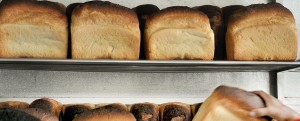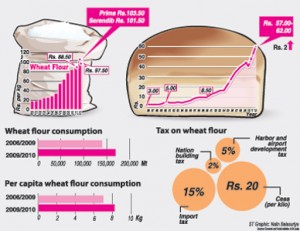News
Illegal flour price hikes take bread out of mouths
“The local bakery industry is, ultimately, going to collapse,” a disgruntled bakery owner in Maradana observed at the new increased prices for wheat flour that led to a price hike in bread.
Prima Group, the largest flour distributor in the country, increased wheat flour prices by Rs. 6 and Serendib Flour Mills (Pvt) Ltd., increased its price by Rs. 4 last month. Consequently, the All Ceylon Bakery Owners’ Association announced an increase of Rs. 2 for a 450 gm loaf of bread, effective midnight October 26.

Consumer Affairs Authority (CAA) Chairman Rumy Marzook said both Prima and Serendib have increased flour prices in violation of the CAA Act of 2003. Under Section 18-2 of the legislation, “No manufacturer shall increase the retail or wholesale price of any goods or any services gazetted as an essential commodity (such as flour) without the prior approval of the CAA,” Mr. Marzook said, while confirming that neither company had applied for approval before announcing new prices.
“Both companies have violated the law and our legal department is currently reviewing this,” he told the Sunday Times.
A Serendib executive said the CAA approved his company’s price increase, and haven’t officially informed the company yet of any legal action. A CAA official said Serendib applied for approval around June, while Prima did not.
“They [the companies] can come to courts and say whatever they want, when the courts summon them,” Mr. Marzook responded.
The Prima Group refused to respond to media inquiries. Serendib Chairman Sathak Abdul Kader was not available for comment.

Housewife Hansi. Pix by Mangala Weerasekera
The CAA’s threat of legal action against flour mills, each time prices go up, has been a regular feature in recent years, albeit without much effect. The CAA has repeatedly sued Prima for unauthorised price increases- once in April 2011 for 2004 price increases, and again in April this year for three price increases in 2006 and 2007. Mr. Marzook said the case filed this April is still ongoing.
The flour mill officials claim the price increases are prompted by fluctuations in wheat grain prices in the world market. A CAA official said companies increase prices when grinding grains cost more. A Serendib executive said processing cost has risen in recent years, because of the increase in fuel and electricity cost, in addition to increase in import duties due to dollar appreciation. Hence flour price hikes are inevitable, the companies say.
“No one suffers more because of this, except the bakery industry,” Bakery Association President N.K. Jayawardena said. “Even if the flour prices are unauthorised, bakeries have to purchase from the distributors regardless. If we say ‘this price is illegal’, they’ll tell us to go buy elsewhere. The CAA always says ‘we are taking legal action’, to save its skin, but nothing happens.”
Bakery owners interviewed by the Sunday Times, were weary of persistent price hikes, with their profits at an all-time low, while customers often blame them.
“It’s hard running a business these days, when prices go up all the time, with profits at an all-time low,” bakery owner Faizal said. “We do business because we can’t rob people,” he said.
“The price increases are not just for flour. sugar, margarine and yeast prices have also gone up, so we cannot maintain our previous profit margins with just a Rs. 2 increase for bread,” shopkeeper Mohammad Rafi said. “To return to previous profit margins, we need to increase at least by Rs. 5. It’s the downfall of the bakery industry,” he predicted.

“Sales decline once prices go up,” bakery supervisor N.J.M. Fahim said. Customers who usually bought two loaves of bread, now go for a loaf-and-a-half. In addition, prices for short-eats like fish buns, cannot be increased, bakery owners said, but prices for flour-based items such as kottu and parata may go up.
Meanwhile, some bakeries have resorted to underhand methods to maintain profit margins, mainly by incorrectly measuring bread and adding excessive amounts of yeast.
“They put in less flour and more yeast. People will certainly get sick because of this practice,” Rafi said.
Customers, mainly middle-class wage earners, depend on bread, especially during rainy days. Most of them, tired of never-ending price hikes, were resigned to their fate of having to eat less.
“Prices are going up, but what to do. I have to buy two roast bread despite the price.” housewife Umma said.
Hansi, another housewife with a toddler, said nowadays she doesn’t buy bread as much as she used to. Dinali, a former office worker with a child, said salaries do not keep up with the increased cost of living, so her family has to cut back on expenses such as clothing, to compensate for increased food prices. Sometimes, buying cheaper alternatives to regular food, helps, she added.
“No matter what anyone says, people eat bread,” Faizal added. “Even paddy owners like us eat bread. Customers complain to us all the time, but there is no interest to rectify this. It is nothing but more talk, ” he added.
Mr. Jayawardena said the Association has requested tax relief from the Government to soften the blow.
“About 900,000 people depend on this industry,” he said. “There’s a 2% NBT tax per 20kg of wheat flour and then about 14% VAT on bread, fish and so on. It’s almost like we worked for losses in the last three years. We appeal for reduction in taxes to give us relief,” he said.
Follow @timesonlinelk
comments powered by Disqus






















